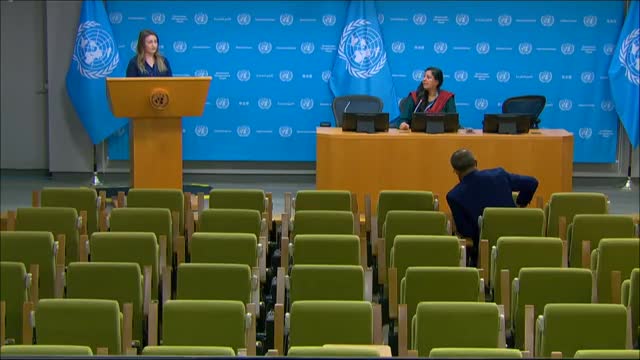UN independent expert says financial tools are being used as weapons, urges institutional reform
Get AI-powered insights, summaries, and transcripts
Subscribe
Summary
An independent United Nations expert warned at a New York press briefing that debt, taxes and illicit financial flows are being used to sustain conflict and called for reforms to the Security Council, IMF and World Bank.
Ms. Morris, an independent expert who presented a report on finance and peace at a United Nations press briefing in New York, said on Oct. 26 that debt, tax policy and illicit financial flows are now being used as instruments that sustain and intensify armed conflict.
In a concise address followed by questions, Morris told journalists that countries and private investors are using financial tools to undercut civilian life and to profit from weaponry, and she called for major institutional reforms to reduce the harms she documented. "There is blood on the budget lines," she said, summarizing a theme of her report.
Morris said rising interest rates, currency fluctuations and mounting surcharges on indebted countries are increasing economic stress and the potential for conflict. She cited Ukraine, Bangladesh and Sri Lanka as examples of places where debt and economic distress have contributed to social upheaval and said withholding of tax revenues can have immediate humanitarian effects. "The result of this withholding of taxpayer revenue means that hospitals are being shut down," she said, referring to the Palestinian Authority as an example raised in her report.
She described illicit financial flows and restrictions on cross-border transactions as additional mechanisms that can block lifesaving resources. Morris said anti–money‑laundering and terrorism-financing measures had led to limits on transfers to the Palestinian Authority after waivers were lifted for two banks; she warned those measures can have humanitarian consequences when banking channels close.
Morris also described the role of private investment in the arms industry. She said only "about only 5 or 6 countries in the world actually have private companies of arms" and that large asset managers, including BlackRock and State Street and a third firm, have a substantial share of investments in military companies — a figure she summarized in her report as "almost 16%" in those holdings. She said the profitability of arms producers creates incentives for brokers and investors to favor weaponry over peaceful alternatives.
Asked by Gabriel Lozano of Al Jazeera what surprised her in compiling the report, Morris said she was struck by advertisements for the "cheapest bullet in the world" and by the links between pension funds and private military suppliers. "For somebody who works in finance, I think the other thing that really struck me was...the Norwegian pension fund that invests in military companies," she said.
In response to a question from Abdul Hamid Sayam of Arabic Veil Al Qudsal Harabi about corruption, Bretton Woods reform and trade rules, Morris reiterated recommendations from her report: she called for restructuring the United Nations, removing veto privileges at the Security Council that she said undermine peace efforts, and pressing the International Monetary Fund and World Bank to take on a remit better aligned with human well-being. "It is time for The United Nations to take that over," she said of designing a new international financial architecture, and she added that "Sanctions are only allowable by the Security Council and that should be maintained." She also urged transparency in debt agreements so successor governments are not blindsided by prior commitments.
Morris recommended ending unilateral financial measures that she said can cripple countries, and she singled out the use of FATF blacklists, OECD tax lists and EU listings of noncompliant tax jurisdictions as tools that require reevaluation. She proposed stronger ethical codes for trade and financial conduct during conflicts and called for development of a "law of peace" to complement humanitarian law governing war.
The briefing did not include any formal UN vote or action. No formal decisions were announced; Morris's comments were presented as findings and recommendations from her report and as the basis for further discussion and advocacy.
Questions from the floor were limited; after two questioners Morris closed the session. The expert repeatedly framed her recommendations as institutional reforms rather than immediate policy prescriptions by individual states.
Closing the briefing, the moderator thanked Ms. Morris and noted there were no further questions online.
